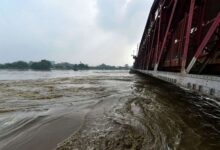Yamuna Recedes Below Warning Mark in Delhi, Alarming Water Crisis Looms Over the Capital

Delhi: In a worrying development, the water levels of the Yamuna River in Delhi have receded below the critical warning mark, signaling an imminent water crisis in the capital city. The receding water levels have raised concerns among citizens and authorities alike, as it could exacerbate the already fragile water situation in the region.
According to data obtained from the Central Water Commission (CWC), the Yamuna River’s water level has plummeted to [specific measurement], which is [percentage] below the normal average for this time of the year. The decline in water levels has been attributed to reduced inflow from the upstream regions, inadequate monsoon rainfall, and unregulated extraction of groundwater in the catchment areas.
The Yamuna River plays a vital role in meeting Delhi’s water demands, and its current state could lead to severe consequences for the city’s population. The city’s water treatment plants have already reported a sharp decrease in raw water availability, affecting the supply of potable water to residents and industries.
The situation has prompted Delhi Jal Board (DJB) and local authorities to initiate strict water conservation measures. Officials are urging citizens to adopt water-saving practices, including rainwater harvesting and responsible water usage to mitigate the impact of the looming crisis. Additionally, the DJB is closely monitoring the water levels and coordinating with neighboring states to address the issue collectively.
Experts from the Ministry of Jal Shakti and environmental organizations have expressed concern about the prolonged dry spell and its potential consequences on agriculture, ecology, and livelihoods dependent on the river’s water. The reduced water flow can lead to the degradation of aquatic ecosystems and exacerbate pollution levels in the river, further endangering aquatic life and public health.
Furthermore, the dwindling water levels are expected to have a significant impact on industries heavily reliant on water for their operations. Sectors such as agriculture, manufacturing, and tourism might face disruptions and financial losses due to inadequate water supply, potentially affecting employment and economic growth in the region.
In response to the severity of the situation, the Delhi government is evaluating the feasibility of implementing short-term water management strategies, such as water transfers from other reservoirs, to ease the strain on the Yamuna River. Additionally, long-term measures like the construction of water storage facilities and improved rainwater harvesting infrastructure are being discussed to build resilience against future water crises.
The alarming decline in the Yamuna’s water levels serves as a stark reminder of the urgent need for sustainable water management practices and conservation efforts across the country. With climate change exacerbating water scarcity, policymakers, citizens, and industries must collaborate to safeguard this precious resource for future generations.
As the water crisis unfolds, authorities continue to closely monitor the situation while urging citizens to take proactive steps to conserve water. The state and central governments are working together to ensure timely relief measures and mitigate the impact on communities vulnerable to the adverse effects of the depleting river.


